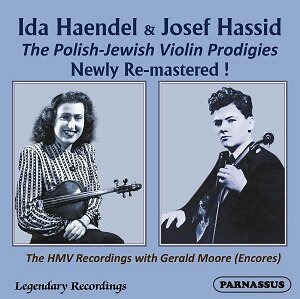
Ida Haendel and Josef Hassid (violins)
The Polish-Jewish Violin Prodigies: Newly Re-mastered!
rec. 1948-53 (Haendel) and 1940 (Hassid)
PARNASSUS PACL95011 [77]
Here we go again on the near-endless merry-go-round of reissues. This time it’s the turn of Ida Haendel and Josef Hassid, Polish contemporaries and classmates at the School of Carl Flesch. This isn’t the first time their recordings have been coupled. Pearl did so, presenting all Hassid’s commercially released 78s with Haendel’s 1940 Deccas. Testament and Opus Kura coupled Hassid with Neveu, whilst on an EMI LP we had Hassid and the young Ricci. On Symposium, meanwhile, Hassid’s discs were coupled with the rare live recordings of the exceptional British violinist, Philip Newman.
Hassid is the great ‘what if’ and his story has been rehashed many times. Born in 1923, a debut in Wigmore Hall in 1940, a series of recordings in the same year (with one made in 1939 that was not released at the time), final concerto performances in March 1941, followed by incarceration because of mental instability, a diagnosis of schizophrenia, a lobotomy, followed by meningitis and then death in 1950. It’s a pitiful catalogue of events and a tiny discography which, because of its extraordinary technical address and stylistic assurance – he was only 16 when he made his HMVs – has astonished listeners ever since. Even today they match the performances of almost any other violinist, so tactile is the playing, so richly variegated tonally, and temperamentally dashing. Zapateado is brilliant and vivid, and Elgar’s La Capricieuse – which he had also recorded in 1939 with Ivor Newton and isn’t here (but can be found elsewhere) – is even more scintillating than Váša Příhoda’s two versions. There are only eight published recordings, but they include Achron’s Hebrew Melody, unsurpassable in intensity, and a richly perfumed version of Kreisler’s Caprice Viennois. Haendel used to complain that the young Hassid’s vibrato was too slow. If it ever was – and I suppose she should know – by 1940 it was anything but slow.
She is represented by HMV recordings made between 1948 and 1953, not the Deccas which were remastered in full by Eloquence (review), thus precluding a compare-and-contrast exercise of both young violinists recorded at the same time. The common denominator in the HMVs is the accompanist, the ever-dependable Gerald Moore. Most of the pieces come from CLP1021, an LP of 1953, but there are a few earlier sides from 1948 and 1950 and they all show her formidable, communicative playing. The Tartini is heard in the then familiar Bridgewater arrangement and is the violin equivalent of the bipartite Boccherini Cello Sonata in A with an expressively cantilevered Andante and a fizzing Presto. She still uses the anachronistic piano accompaniment in Pagnini’s famous Caprice. Her Dvořák Slavonic Dance is stylish but underpowered. She always played Bartók’s Six Romanian Folk Dances well and is quietly seductive in Ravel’s Habanera. It’s quite unusual to hear the transcription of Grieg’s Scherzo-Impromptu from the Moods collection, Op.73, though Heifetz also recorded it. She gives a good account of herself in Copland’s relatively new Hoe Down from Rodeo.
Transfers have been carried out well. The Hassid HMV 78s were in any case in excellent sonics for the time. There are some good booklet notes too.
I am going to overlook the hyperbolic ‘Newly Remastered!’ in the disc title, along with that pesky, almost self-mocking exclamation mark, in favour of commending the disc selection.
Jonathan Woolf
Help us financially by purchasing from


Contents
Giuseppe Tartini (1692-1770)
Andante and Presto arr. Bridgewater
Niccolò Paganini (1782-1840)
Caprice for solo violin, Op. 1 No. 24 in A minor (1824)
Ernest Bloch (1880-1959)
Baal Shem No. 2: Nigun (1923)
Antonín Dvořák (1841-1904)
Slavonic Dance No. 2 in E minor, Op. 46 No. 2 (1878)
Johannes Brahms (1833-1897)
Waltz, Op. 39 No. 15 in A flat major
Béla Bartók (1881-1945)
Romanian Folk Dances, Sz.56 (1915) arr. Székely
Maurice Ravel (1875-1937)
Vocalise-étude en forme de habanera (1907)
Henryk Wieniawski (1835-1880)
Polonaise brilliante No. 1 in D major, Op. 4 (1853)
Edvard Grieg (1843–1907)
Moods, Op. 73: Scherzo-Impromptu No. 2 (1905)
Aaron Copland (1900-1990)
Hoe down from Rodeo (1942)
Ida Haendel (violin), Gerald Moore (piano), rec. 1948-53
Pyotr Ilyich Tchaikovsky (1840-1893)
Souvenir d’un lieu cher: Mélodie, Op.42 No.3 (1878)
Antonín Dvořák (1841-1904)
Humoresque Op.101 No.7, B. 187 (1894) arr. Kreisler
Jules Massenet (1842–1912)
Méditation from Thaïs arr. Marsick (1894)
Edward Elgar (1857-1934)
La Capricieuse, Op. 17 (1891)
Pablo de Sarasate (1844-1908)
Playera, Op.23 No.1 (1880)
Zapateado, Op.23 No.2 (1880)
Fritz Kreisler (1875-1982)
Caprice Viennois, Op.2 (1910)
Joseph Achron (1886-1943)
Hebrew Melody, Op.33 (1911)
Josef Hassid (violin) and Gerald Moore (piano) rec. 1940


















